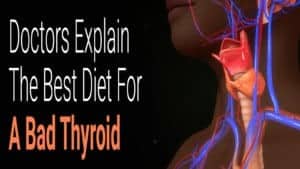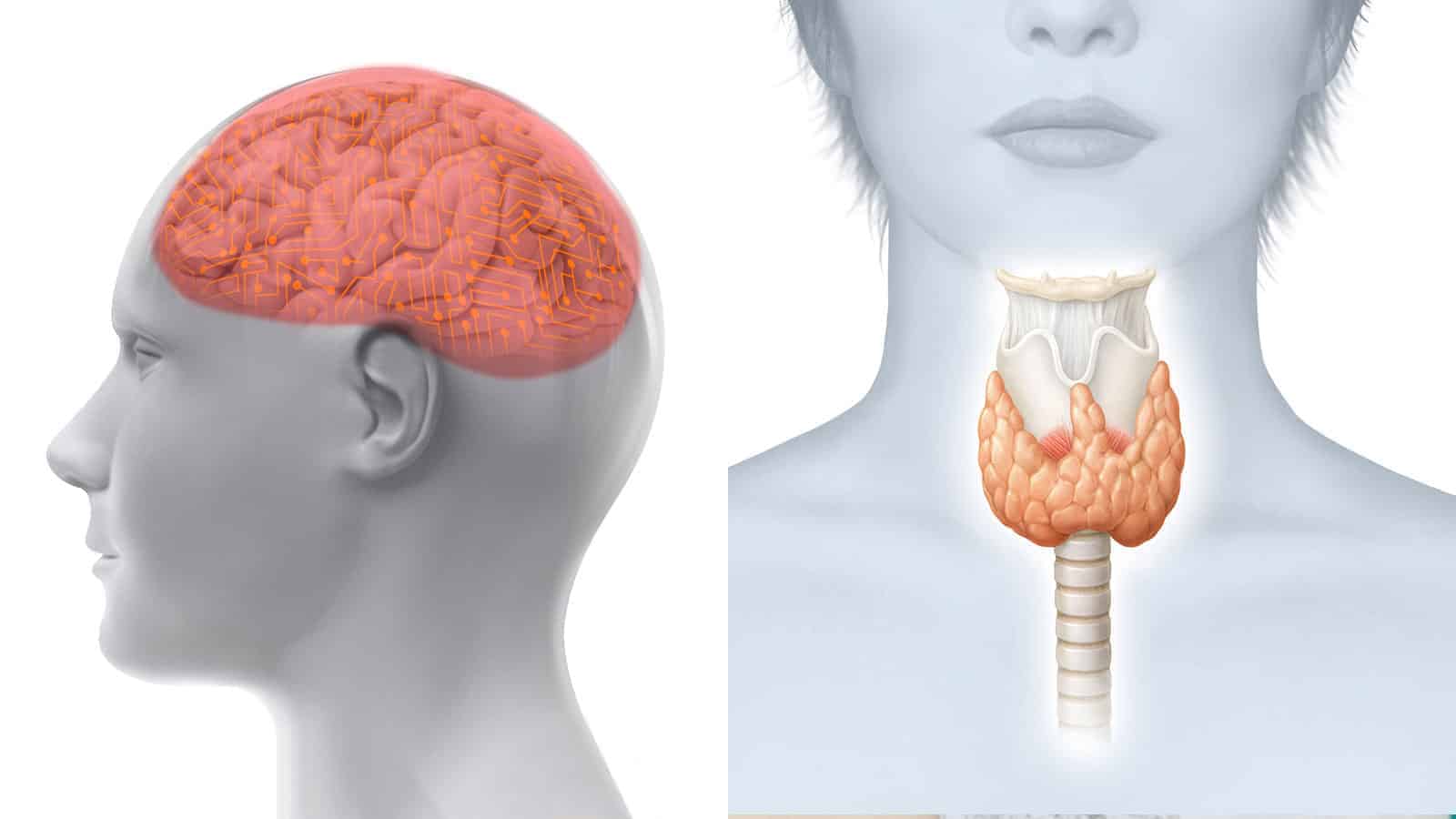Diagnosing any mental health issue is not as easy as just looking at the emotional symptoms. Our bodies are very complex. Additionally, one system plays off of and interacts with a multitude of other systems. So it can be easy to overlook potential simple physical ailments if the symptoms mimic a mental health issue. Thyroid issues are one such possible diagnosis. Researchers reveal how mental health issues could be a sign of thyroid problems.
Thyroid function and purpose in our body
Our thyroid is a gland that sits in our throat near our larynx. It works closely with our pituitary and hypothalamus glands as a part of our endocrine system. That’s important because that system makes, stores, and distributes hormones throughout our body. Furthermore, the thyroid releases two particular hormones called T3 and T4, which aid in regulating multiple functions in the body.
A few of those purposes are:
- Metabolism
- Rate of your heartbeat
- Strength of your muscles
- Body heat
- Cholesterol
- Menstrual regularity
- Breathing rate
- Nervous system
The amount of T3 and T4 released by the thyroid is dependent upon how much TSH (thyroid-stimulating hormone) releases from the hypothalamus. Thus, the TSH acts as a trigger for the pituitary to communicate to the thyroid how much T3 and T4 to release. Proper release of these hormones through the communication of these glands is what keeps the above functions operating correctly. Therefore, a miscommunication via a defect of the thyroid gland may create a chain reaction of too little T3 or T4. This will alter how your body works. Too low T3 or T4 will result in a slower heartbeat as an example. Conversely, if too much is released, then your heart rate will speed up.
Signs of thyroid problems
1- Hyperthyroidism
When too much T3 and T4 is produced, a condition called hyperthyroidism is created. The symptoms of hyperthyroidism are:
- Anxiety
- Mood swings or irritability
- High energy and nervousness
- Sweating or reactive to heat
- Shaking or trembling
- Hair loss
- Menstrual periods become lighter or skip altogether
- Frequent bowel movements
2 – Hypothyroidism
When too little T3 and T4 is produced, it creates the disorder called hypothyroidism. Hypothyroidism is characterized by symptoms of:
- Sleep difficulties
- Fatigue
- Focusing difficulties
- Hair and skin become dry
- Depression
- Feeling cold easily
- Menstrual periods become frequent and heavy
- Pain in your joints and muscles
- Irregular bowel movements or constipation
Your thyroid and the mental health connection
Our hormones play a direct role in our moods, especially for women. When the thyroid is not performing adequately, it strongly affects our reproductive hormones; estrogen, progesterone, and testosterone. These particular hormones don’t just play a factor in our reproduction and sex drive, but also in our cognitive ability and moods.
Hormones and the thyroid
Estrogen is recognized as increasing serotonin and those receptors in the brain. It also acts to control the number of endorphins and their effects on the brain, while also keeping the nerves from damage and encouraging additional nerve growth.
Serotonin is a hormone produced by our nerve cells, which among its many roles, is responsible for regulating the balance of your mood to prevent swings of emotions. It also plays a role in our sleep, digestion, ability to heal from a wound, ability to remember things learned, anxiety, and relaxation.
Progesterone and estrogen both play a role in how serotonin is released. High levels of progesterone can decrease one’s serotonin levels. Testosterone, while gender-dependent, also can raise or lower the level of serotonin that binds in the brain.
Endorphins, produced by the pituitary gland, attach themselves to our brain’s receptors. It affects how much pain we feel and aids in relaxation. We usually attribute endorphins to the “rush” we get after working out, but this can happen doing any activity that makes us feel good.
The link between hormonal imbalances and mental health
Upon understanding how thyroid disease can alter our hormonal balance, we can see where it alters our mood and cognitive functions. We then need to look at where related symptoms of both thyroid disease and depression, anxiety, or bipolar symptoms demonstrate a similarity. In the instance of hyperthyroidism, some of the symptoms are parallel with indicators for anxiety and bipolar depression:
- Unable to sleep
- Anxiety
- Heart rate increased
- Elevated blood pressure
- Mood fluctuations
- Irritable
Hypothyroidism demonstrates a similarity to depressive symptoms, including a decrease in cognitive function:
- Processing information is difficult
- Loss of memory
- Low energy or fatigue
- Weight gain
- Bloating
- Difficulty with concentration
Researching thyroid issues and anxiety
One study performed at the MM Institute of Medical Science and Research in India by Manish Bathla, Manpreet Singh, and Pankaj Relan, examined the occurrence of anxiety and depression within a group diagnosed with hypothyroidism. They tested a total of 100 volunteers, of which 70% of the group were women, using the Hamilton depression rating scale or the Hamilton scale for anxiety. A total of 60% of the group reported depressive symptoms, and about 63% reported anxiety. In both instances, the women made up a slightly higher percentage than the men.
The overall conclusion was that one could develop coinciding cases of both thyroid disease and depression and anxiety, brought on by the thyroid disorder, which can then result in ongoing co-existing disorders. This comorbidity can create a fractured image of the actual diagnosis, especially if one has already been diagnosed previously with one condition.
It was expressed that someone with a mental illness diagnosis should be checked to rule out thyroid disease. Conversely, if one is diagnosed with a thyroid disorder, it’s suggested that the patient should see both an endocrinologist and a psychiatrist for treatment of depression or anxiety.
Studying bipolar depression and thyroid issues
Another study was performed by researching and analyzing the multitude of previously performed studies related to hypothyroidism and bipolar and depressive symptoms. Additionally, they looked at the connection between hypothyroidism and bipolar disorder with a special concentration on rapid cycling bipolar. Rapid cycling bipolar is when the patient flips from hyper or manic symptoms to depressive symptoms quickly in a relatively short period of time.
In this study, the scientists didn’t just look at the thyroid. They looked at the interplay of the thyroid, pituitary and hypothalamus (HPT) that then affects our mental and emotional abilities as a whole.
The study states that hypothyroidism often proves to be a common factor in those diagnosed with bipolar. In particular, that’s a fact for those with rapid cycling bipolar and similar conditions. That’s because Lithium, a medication often prescribed for bipolar conditions, works against the functioning of the thyroid and create or worsen hypothyroidism conditions in people who already have a tendency toward the condition or have already been given the diagnosis.
The findings suggest a strong connection
The conclusion was that there is a distinct effect on the brain from the thyroid or the HPT hormones. This correlates directly with the malfunctioning thyroid and the course, treatment, and outcome of bipolar disorder. Moreover, even small deviations in the hormonal release of the HPT can create changes in displayed symptoms of bipolar.
As a treatment, Lithium can act to exasperate this in those predisposed to HPT imbalances. It suggests that medical professionals should maintain a tight watch on the HPT hormonal balance, especially if prescribing lithium. While this was the conclusion, the researchers are still studying the exact reason behind this outcome.
 Final Thoughts on Linking Thyroid Problems to Mental Health
Final Thoughts on Linking Thyroid Problems to Mental Health
The functions of all the elements which make up our beautiful bodies and minds are extremely complex. Think of a pond. For instance, it only takes dropping a pebble to have a large ripple effect.
Of course, it’s possible your doctor could reach a conclusion that may only be partially correct based on given symptoms. Because of the overlapping symptoms that can complicate reaching the correct diagnosis, such is the case with mistaking thyroid disease for mental illness.
So with the knowledge that mental health issues could actually be a sign of thyroid problems, make a note of all of your symptoms, not just the most obvious ones. Ask your family doctor to check your thyroid once a year and stay vigilant about your health and wellbeing.

















